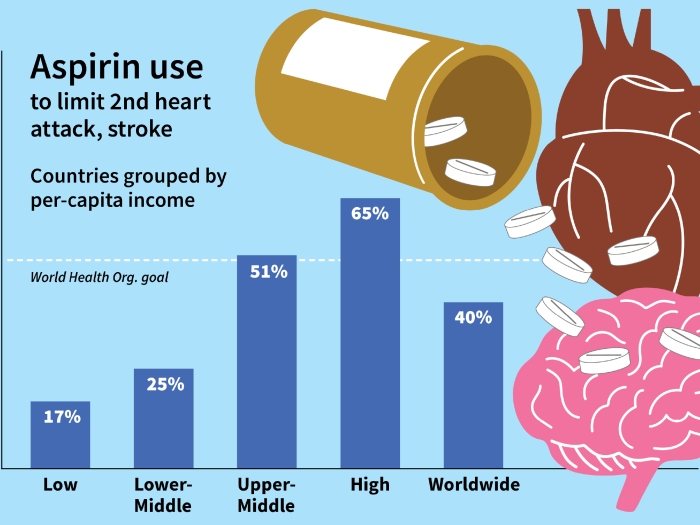New genetic research finds spontaneous coronary artery dissection, or SCAD, heart attacks may be more similar to different diseases than to other heart attacks.
5:00 AM
Author |

Rather than a slow build-up of plaque over time, a heart attack caused by spontaneous coronary artery dissection strikes suddenly, often in younger women who didn't seem to be at risk for a cardiac event.
SCAD is poorly understood, and it's so far impossible to predict which combination of genes and environmental triggers will lead coronary arteries to spontaneously tear, or dissect, leading to a heart attack that requires emergency, life-saving medical care.
LISTEN UP: Add the new Michigan Medicine News Break to your Alexa-enabled device, or subscribe to our daily updates on iTunes, Google Play and Stitcher.
Researchers have now uncovered additional genetic clues to better understand SCAD, which are desperately needed, says senior author Santhi Ganesh, M.D., from the Michigan Medicine Frankel Cardiovascular Center. The genes Ganesh and colleagues have identified further illustrate the difference between SCAD and the more common heart attack, when plaque builds up in the artery and limits blood flow, called atherosclerosis.
"The SCAD risk alleles were inversely associated with coronary disease and myocardial infarction due to atherosclerotic disease, suggesting very different underlying biology in the artery causing each type of heart attack," Ganesh says. "It is especially intriguing that many of the same genetic markers are involved, but in different ways, in both SCAD-induced heart attack and atherosclerotic heart attack."
SEE ALSO: Woman Suffers 2 Heart Attacks in 3 Days Due to SCAD
The researchers performed a genome-wide association study, analyzing millions of genetic markers in patients with SCAD and healthy controls. They found a significant association of several specific genetic regions associated with SCAD, which further implicated specific genes influenced by the identified genetic variants, Ganesh says.
It is especially intriguing that many of the same genetic markers are involved, but in different ways, in both SCAD-induced heart attack and atherosclerotic heart attack.Santhi Ganesh, M.D.
In addition, researchers report that the genetic risk factors for SCAD also predict SCAD among individuals with fibromuscular dysplasia, or FMD, a vascular disease that may affect any artery in the body and is found in some patients with SCAD. Many people with FMD also lack traditional risk factors underlying atherosclerosis, like high blood pressure and diabetes, researchers say, but still may be at risk for vascular complications such as arterial aneurysms and dissections.
"As a physician caring for patients with both FMD and SCAD, it is gratifying to see results from our research that are beginning to uncover the genetic architecture and risk for these diseases about which so little is known," Ganesh says. "This unbiased and large-scale analysis has provided us with new clues for where to focus our next steps of research, which is urgently needed. We are grateful for the participation of our patients, without whom these studies and new insights would not be possible."
Finally, the SCAD risk alleles were positively associated with migraine headache, which highlights a shared genetic basis for migraine headache and SCAD. Ganesh says more research is needed to precisely define the biological relationship of SCAD to vascular diseases such as FMD and migraine headache, as well as its implications for clinical care.
SEE ALSO: What Mothers and Younger Women Should Know About SCAD
"Identifying these genetic risk alleles helps further advance our understanding of risks of SCAD," says co-lead author Jacqueline Saw, M.D., from Vancouver General Hospital/University of British Columbia. "Whether these findings have implications for SCAD in high-risk populations, such as those with peripartum SCAD, is an important next step of this research."
The team's work relied upon international large-scale collaborations including the Canadian SCAD Study, the University of Michigan Genetic Study of Arterial Dysplasia, the UK Biobank, the Million Veteran's Program and the Michigan Genomics Initiative, from which thousands of healthy controls boosted the team's ability to detect genetic associations.
The next step is to conduct studies on larger groups of patients with SCAD, and to conduct further in-depth studies of the genetic and biologic relationship between SCAD and FMD, and related dysplasia-associated arterial diseases, Ganesh says. The group is launching a clinical and genetic study of peripartum, or postpartum, SCAD.
To learn more about this research, visit U-M Health Research or the Ganesh Lab's website.
Paper cited: "Chromosome 1q21.2 and additional loci influence risk of spontaneous coronary artery dissection and myocardial infarction." Nature Communications. DOI: 10.1038/s41467-020-17558-x

Explore a variety of healthcare news & stories by visiting the Health Lab home page for more articles.

Department of Communication at Michigan Medicine
Want top health & research news weekly? Sign up for Health Lab’s newsletters today!





